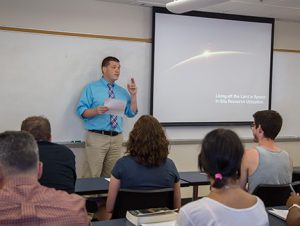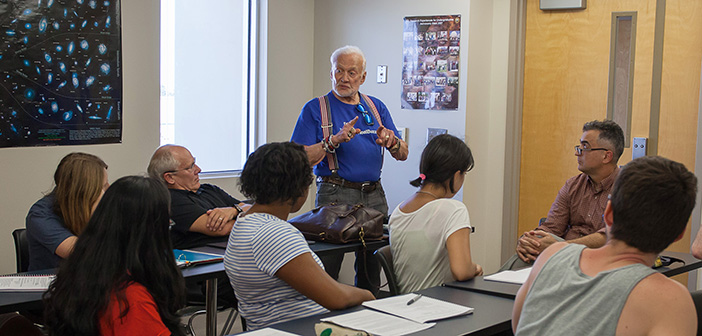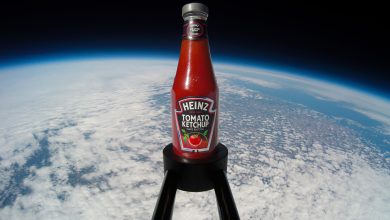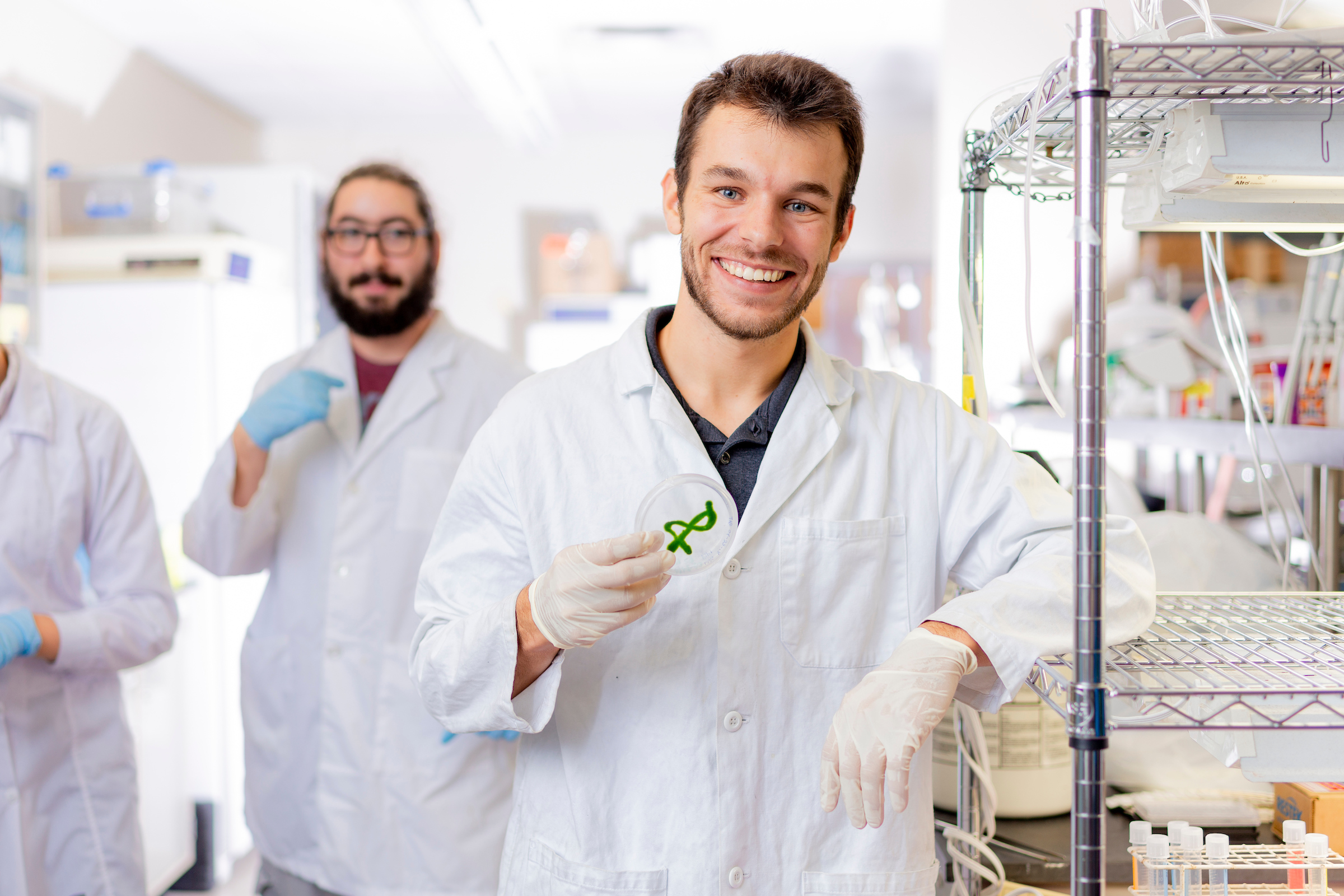Mission to Mars: The Buzz Aldrin Space Institute at Florida Tech
By Shelley Preston

Class began with a hum of nervous energy; students fidgeted in their seats, eyes drifted around the room. There was a rumor that the world’s most famous astronaut would make an appearance here in this small intimate classroom on the fourth floor of the Olin Physical Sciences Center. Heads kept turning to the door near the back of the room as astrophysics professor Daniel Batcheldor went over the syllabus for the brand new class called “Living off the Land in Space: In-Situ Resource Utilization.”
Anyone who follows the astronaut on Instagram knows he jets around the world promoting STEAM— the acronym for Science, Technology, Engineering, Art and Mathematics—often wearing his Get Your Ass to Mars T-shirt while flanked by giddy fans. So, maybe he wouldn’t make it: best to expect disappointment.
But, just as Batcheldor handed the conversation over to NASA scientist Jeffery Smith, the professor leading the think tank-like course, the door cracked open. There he was: Buzz Aldrin, decked out in rainbow suspenders, chunky crystal bracelets and rings on every finger—including a gold band with a diamond crusted star on one end and a crescent moon on the other.
Aldrin, the Apollo pioneer, didn’t disappoint.
This visit came a little more than a year after the Buzz Aldrin Space Institute (BASI) debuted at Florida Tech with the intention of not only getting man to Mars but also colonizing the planet. Since that time, workshops, symposia and brainstorming sessions with Florida Tech faculty, partnering universities and industry leaders have honed in on several key areas of research that aim to make Aldrin’s dream a reality.
In fact, the In-Situ class, which finished its first run in December, is part of BASI’s goal to train the next generation of space innovators.
Buzz Aldrin dictates the mission of his institute, but it’s his son, Andrew Aldrin, who directs the day-to-day affairs. The younger Aldrin’s career has focused on the business side of space as president of Moon Express and former director of development for both Boeing and United Launch Alliance. Today, he’s using his acumen at Florida Tech to produce peer-reviewed research yielding tangible results.
“Our focus is to take on fundamental problems of colonizing Mars,” Aldrin says. “Real science needs to be done before getting anywhere close to engineering and technology. Florida Tech is well-situated to solve some of the problems that require more thinking and less hardware: building things, growing things and keeping people sane.”
The Buzz Aldrin Space Institute at Florida Tech has identified several key research and education initiatives that are already under way:
Space Entrepreneurship
Proposed Establishment of the ISU-Robert A. Heinlein Institute for Space Entrepreneurship and Space Innovation
Proposed to be located at Kennedy Space Center Visitor Complex, the academic program would partner with space researchers around the world to create a think tank environment for eligible students and offer certificates in Commercial and Entrepreneurial Space Studies. Andrew Aldrin says the location offers the advantage of a constant influx of scientists and engineers coming to the Cape to launch their rockets and experiments. He hopes to bring in VIP for training and lectures while they’re on location.
Training the Next Generation of Space Leaders
A flight to Mars is still decades away, which is why it is important to teach and encourage students to do research that will be fundamental to future missions. Classes such as “In-Situ Resource Utilization Mission Design” and curriculum focused on innovation encourage students to think of feasible ways of getting to the red planet and staying there long term. Batcheldor says this research will also have a positive impact here on Earth: “Thinking about ways to live on Mars is the ultimate test of sustainability; those new ideas can be applied right here on this planet.”
Research
Martian Gardening
NASA says shipping food to Mars will cost about $1 billion per astronaut per year. Any attempt at a sustained presence on Mars means eventually growing food there. In partnership with NASA scientists, Florida Tech researchers are growing Outredgeous lettuce (a variety of red romaine) in a variety of settings from Earth soil to regolith simulant to find the magic formula for the type and amount of nutrients needed to grow a plant in inhospitable Martian dirt. Florida Tech also wants to make a more accurate regolith simulant with a chemical composition closer to real Martian dirt than what scientists currently have available to them.
Lunar Ice Propellant
Fuel is expensive and heavy, so repeated, long-duration travel to Mars will require novel ways to fuel spacecraft. Lunar ice is one material that may be prospected for fuel as well as ice on meteors and Martian moons. Areas of study include prospecting from the air, reliability of various fuel sources, examining the complexity of creating fuel in-situ and storage solutions in space.
Buzz Aldrin may not show up to every class personally as BASI gains momentum, but he’s passing the torch on to those destined to be the first Martians who embrace his can-do attitude and dedication to deep space travel—and Florida Tech is poised to lead the way.





